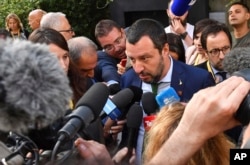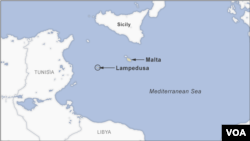Migrants hijacked a cargo ship in Libyan waters Wednesday and forced the crew to redirect the vessel north to Europe, according to Italian and Maltese authorities.
As the vessel headed in a direction leading to the island nation of Malta and Italy's shores, both countries vowed to keep the hijacked ship out of their territorial waters.
Italian Interior Minister Matteo Salvini identified the ship as the Turkish oil tanker El Hiblu 1 and said the crew had earlier rescued migrants in the Mediterranean Sea. He put the number of migrants on board at around 120 and described what was happening as ``the first act of piracy on the high seas with migrants that hijacked'' a cargo ship.
“Poor castaways, who hijack a merchant ship that saved them because they want to decide the route of the cruise,” Italian news agency ANSA quoted Salvini saying with sarcasm.
There was no immediate word on the condition of El Hiblu I's crew. Other information about the reported hijacking was unavailable or difficult to confirm while the vessel remained at sea.
Italian media reports said the ship was heading to Libya to drop off the group that was rescued when migrants seized control six miles from the Libyan coast.
A private group that operates a rescue ship and monitors how governments treat migrants, Mediterranea Saving Humans, urged compassion for the group on the hijacked vessel and said it hoped European countries would act “in the name of fundamental rights, remembering that we are dealing with human beings fleeing hell.”
The Armed Forces of Malta said military personnel were standing by and the tanker still was in Libyan territorial waters as of early Wednesday night.
A Maltese military official told Maltese media the ship was carrying 108 migrants. The official was not authorized to speak to reporters and requested anonymity.
The official also said Malta would not allow the ship to enter the country's waters.
Salvini said weather conditions were not good and it was too early to tell if the ship was being directed toward Malta or Italy's Lampedusa island. But he had a message for the pirates: “Forget about Italy.”
Mass migration to Europe has dropped sharply since 2015, when the continent received one million refugees and migrants from countries in the Middle East, Asia and African. The surge created a humanitarian crisis in which desperate travelers frequently drowned and leading arrival spots such as Italy and Greece struggled to house large numbers of asylum-seekers.
Along with the dangerous sea journey itself, those who attempt to cross the Mediterranean risk being stopped by Libya's coast guard and held in Libyan detention centers that human rights groups have described as bleak places where migrants allegedly suffer routine abuse.
European Union member countries, responding to domestic opposition to welcoming immigrants, have decided to significantly downscale an EU operation in the Mediterranean, withdrawing their ships and continuing the mission with air surveillance only.
EU officials on Wednesday lamented the move, while Amnesty International reiterated its view that Europe's collaboration with Libya to stem migration was a human rights outrage.
EU members “alert the Libyan coast guard when refugees and migrants are spotted at sea so they can be taken back to Libya, despite knowing that people there are arbitrarily detained and exposed to widespread torture, rape, killings and exploitation,” Matteo de Bellis, an international migration researcher for Amnesty.
“This shameful decision has nothing to do with the needs of people who risk their lives at sea, but everything to do with the inability of European governments to agree on a way to share responsibility for them.”


